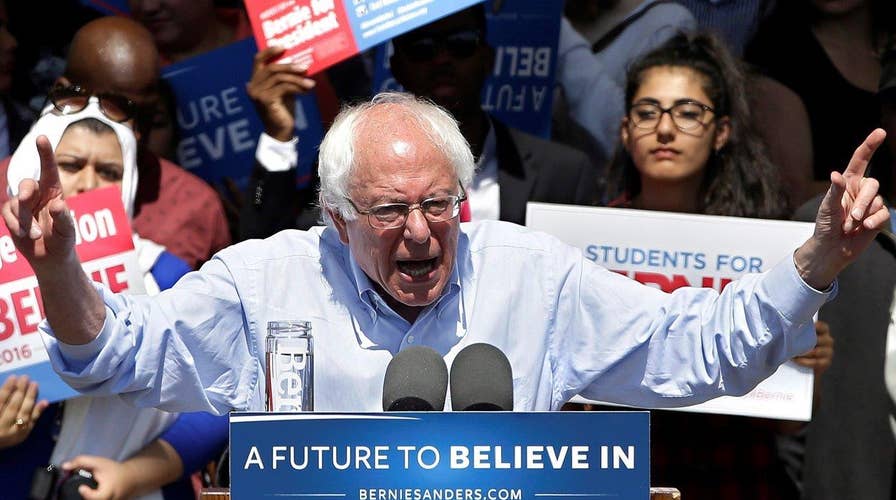Sen. Bernie Sanders won the West Virginia Democratic primary Tuesday to stay alive in his long-shot bid to take the party’s presidential nomination from front-runner Hillary Clinton, while Republican Donald Trump won primaries in West Virginia and Nebraska.
Sanders had roughly 51 percent of the West Virginia vote, compared to 36 percent for Clinton, with 94 percent of precincts reporting.
Trump, his party’s presumptive presidential nominee, was running uncontested in both states.
“We won a big, big victory,” Sanders said at a rally in Salem, Oregon. “The people of West Virginia … said we need an economy that can help more than just the one percent.”
The self-described democratic socialist has now won 19 states, compared to 23 for Clinton. But he still faces an extreme “uphill climb” toward winning the party nomination, in his own words.
Trump did not hold a victory rally but said in a statement: “It is a great honor to have won both West Virginia and Nebraska, especially by such massive margins. … Hope to win both states in the general election.”
Nebraska technically held a Democratic primary, which Clinton won 53-to-46 percent, with 100 percent of precincts reporting.
However, Sanders won Nebraska in March in a caucus. He was awarded 15 pledged delegates. Clinton won 10 pledged delegates and the support of three superdelegates.
The Vermont senator had won 16 of 29 delegates available in West Virginia, with 120, 321 votes, or 51 percent. Clinton had 11 delegates, with 84,176 votes, or 36 percent, with 94 percent of precincts reporting.
However, Clinton has an insurmountable lead in the delegate race -- 2,239 compared to 1,469 for Sanders, with just nine more contests remaining. It takes 2,383 delegates to win the Democratic nomination.
Sanders has acknowledged his only hope to win the nomination is to go to the party’s nominating convention in July and convince enough superdelegates to cast ballots for him -- amid calls from Democratic leaders to exit the race.
Next week, Sanders and Clinton will compete in Kentucky and Oregon, for 55 and 61 delegates, respectively. Oregon will also hold a GOP primary in which 28 delegates are available.
Texas Sen. Ted Cruz dropped out of the GOP primary last week but re-emerged Tuesday to add some intrigue into the race.
Cruz said he’s still out of the race but that his campaign would “certainly respond accordingly” if a path to victory emerges.
He also has written to state party chairmen to hold onto the delegates he won in primaries and caucuses. And he’s submitted a delegate slate to the secretary of state in California, which votes June 7, Fox News has learned.
Full Results From Tuesday's Primaries
California state director Jason Scalese downplayed Cruz's effort, saying it was the first-term senator’s attempt to “keep faith” with supporters.
Cruz and Ohio Gov. John Kasich suspended their campaigns last week after Trump’s huge Indiana primary win.
Trump, a billionaire businessman, has now won 30 state primaries or caucuses but must now try to get support -- including fundraising help -- from Washington Republicans.
He is scheduled to meet Thursday with House Speaker Paul Ryan and other Capitol Hill Republicans, as he prepares for the general election.
“I have a lot of respect for Paul,” Trump said on Fox News’ “The O’Reilly Factor.” “He loves this country. He wants to see something good happen to this party.”
Trump also confirmed a report that he now has five potential running-mates in mind.
He has 1,107 delegates toward to getting 1,237 to secure the nomination before his party’s nominating convention in July.
Trump won all 36 delegates available in Nebraska. He had 119,531 votes, or 61 percent, with 95 percent of precincts reporting.
Trump secured three of the 34 delegates available in West Virginia and 151,307 votes, or 76 percent of the vote, with 98 percent of precincts reporting.
Clinton’s remarks in March about “putting a lot of coal miners and coal companies out of business” severely hurt her chances of winning in West Virginia.
The former secretary of state apologized in person for the comment, which she said was taken out of context, but skipped campaigning in West Virginia.
Trump campaigned in West Virginia, donning a hard hat and pretending to shovel coal at a rally last week while vowing to help the struggling fossil fuel industry and its legions of out-of-work miners.
“I'm going to put miners back to work,” he told the crowd. Clinton “said I'm going to put mines out of business. That's a tough one to explain.”
The GOP presumptive presidential nominee also told the crowd to "save your vote for the general election. The primary's gone.”













































